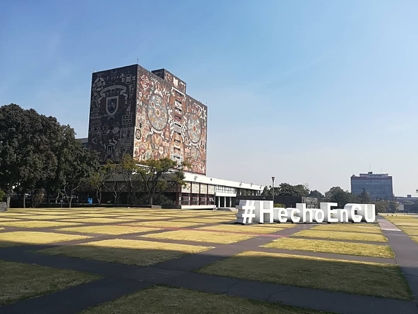|
image © Barbara Ibinarriaga Soltero Barbara Ibinarriaga-Soltero, PhD student, Cardiff University Psychologist at UNAM, C.U.
“Hecho en C.U.” which means “Made in C.U.”, is an important phrase to express the identity attached to being either a current or an ex-student at National Autonomous University of Mexico (UNAM) in the main campus in Mexico City. Although the origin of this expression comes from the celebration of a football soccer player, Jaime Lozano, from the team Pumas UNAM (Espinosa Beltrán, 2005), it can take different subjective meanings and symbolism. In this case, “Made in C.U.” refers to my professional development as a Psychologist in this Alma Mater well-ranked in Latin America (QSWUR 2018). It also speaks for the historical relevance of the Central University City Campus of the UNAM recognised in the World Heritage Collection (UNESCO, 2007), and for its reference in its bibliographic collection, including more than 13 million titles sheltered in 135 libraries (Fundación UNAM, 2016) encompassing the Central Library (see image). My training as a Psychologist at UNAM involved a deep engagement with a positivistic perspective towards the study of mindfulness; that is, objectifying mindfulness as a quantifiable process or intervention from which changes in psychological process and behaviour could be measured and reported. This constituted the more accepted approach to study the topic which obeyed not only a disciplinary logic within psychology (i.e., looking at psychological processes as observable and assessable phenomena; Haig, 2014) but from the development within the scientific ground as a whole, presenting Mindfulness-based interventions backed with scientific evidence of its efficacy and applicability in different scenarios (e.g. from health and education to the workplace and the criminal justice system; see Mindful Nation UK, 2015). However, mindfulness within the social sciences has been investigated in many interesting ways (Ibinarriaga-Soltero, 2017). For instance, it has been used as a method towards psychosocial investigation (Stanley, Barker, Edwards, & McEwen, 2014), and some of the recent studies have looked at participants' subjective experience through first-person perspective methods (Stelter, 2009). This stream of research has been of academic interest for my doctoral research in three levels: epistemologically regarding the way of approaching the topic, not only as a researcher but as a practitioner (Alvesson & Sköldberg, 2009), ontologically as to understanding mindfulness as a practice intertwined with social and cultural aspects of the individual (Stanley, 2012) and not solely to her or his cognitive process located in the brain as empathised by research in neuroscience, and methodologically relevant as to the research design and the methods widely employed to investigate and to comprehend widely mindfulness within a particular geographical, social, and cultural context such as Mexico. Why Archive Searches and Document Analysis? One of the challenges that my research has set up so far is the need of conducting archives searches and analysis of documents to historically understand how mindfulness and other meditation practices, which have their origins in Buddhist Philosophy from East Asian countries, have been imported and commodified (Hyland, 2015) in Western countries. These methods have been poorly used among psychologists and specifically within the field of mindfulness studies. In the case of my doctoral research, I see a parallel of the significance of archives and documents as sources in social science research and some of the Buddhist texts. For instance, the Pāli Canon which is considered the authoritative source of Buddha´s teachings (Bhikkhu Bodhi, 2005) which have been passed from generation to generation for more than 2,500 years now. These Buddhist records such as other types of documents such as meditation diaries, policy reports, records of conferences and events as well as constitutive acts of different organisations constitute sources for collecting data which eventually aid a deepening understanding of human life and historically situation the transformation of knowledge and practices in different societies. By attending the GW4 workshop 'Methodological approaches to document analysis in Social Sciences' offered at Cardiff University, I was introduced to a new perspective to frame my research. It wouldn´t be possible for me to go back to my former University Campus, UNAM C.U., and conduct an archives search without being immersed within the diversity of approaches and art of working with documents during the workshop. I remain thankful for the Documents Research Network for organising the training session, as it was the starting point to develop the pilot study I am conducting in Mexico City at the moment. This study considers a documents analysis as data collection plan to understand historically which main factors have influenced the appropriation of Buddhism and the implementation of contemplative practices in the Mexican context, which also includes identifying pioneers of this movement through the archives search. The phrase “Hecho en C.U” means to me not only an identity affiliation of the place where I started my training as a psychologist, but a starting point of my journey of searching archives and analysing documents - which potentially would influence and contribute approaches to mindfulness studies within the social sciences. References Alvesson, M. & Sköldberg, K. (2009). Reflexive methodology: New vistas for qualitative research. (2nd ed.). London, England: Sage. Bhikkhu Bodhi. (Ed.). (2005). In the Buddha´s words: An anthology of discourses from the Pāli Canon. US: Wisdom Publications. Espinosa Beltrán, A. (2005, June). Hecho en C.U: De cómo los Pumas me devolvieron la identidad [Made in C.U: How the Pumas restored my identity]. Revista Digital Universitaria, 6(6), 2-7. Retrieved from http://www.revista.unam.mx/vol.6/num6/art56/jun_art56.pdf Fundación UNAM. (2016, November). Acervo bibliográfico de la UNAM: El más importante de América Latina [Bibliographic collection of the UNAM: The most important in Latin America]. Retrieved http://www.fundacionunam.org.mx/unam-al-dia/acervo-bibliografico-de-la-unam-el-mas-importante-de-america-latina/ Haig, B. D. (2014). Investigating the psychological world: Scientific method in the behavioural sciences. London, England: MIT Press. Hyland, T. (2015). The commodification of spirituality: Education, mindfulness and the marketisation of the present moment. PROSPERO: Philosophy for Education and Cultural Continuity, 21(2), 11-17. Ibinarriaga-Soltero, B. (2017, January-July). Atención consciente (mindfulness): Una mirada crítica [Mindfulness: A critical perspective]. Journal of the International Coalition of YMCA Universities (8th ed.), 5(8), 73-92. Retrieved from http://ymcauniversitiescoalition.org/wp-content/uploads/2017/08/Eighth-Journal.pdf Mindful Nation UK. (2015). The Mindfulness Initiative. Retrieved http://www.themindfulnessinitiative.org.uk/images/reports/Mindfulness-APPG-Report_Mindful-Nation-UK_Oct2015.pdf QSWUR (2018). QS World University Rankings: Universidad Nacional Autónoma de México (UNAM). Retrieved https://www.topuniversities.com/universities/universidad--autonoma-de-mexico-unam#wurs Stanley, S. (2012). Mindfulness: Towards a critical relational perspective. Social and Personality Psychology Compass, 6(9), 631-641. Stanley, S., Barker, M., Edwards, V., & McEwen, E. (2014). Swimming against the stream? Mindfulness as a psychosocial research methodology. Qualitative Research in Psychology, 12, 61-76. Stelter, R. (2009). Experiencing mindfulness meditation—a client narrative perspective. International Journal of Qualitative Studies on Health and Well-being, 4, 145–158. UNESCO. (2007). World Heritage List: Central University City Campus of the Universidad Nacional Autónoma de México (UNAM). Retrieved http://whc.unesco.org/en/list/1250 Biography: Barbara Ibinarriaga-Soltero is a PhD student in Social Sciences at Cardiff University. She graduated as a Psychologist from National Autonomous University of Mexico (UNAM) in Mexico City, where she first started practising mindfulness and conducted research on the topic. Organising and delivering workshops based on mindfulness, emotional regulation and body awareness for students and lecturers was part of her professional development before she moved to the UK to study her Master´s degree in Social Sciences Research Methods. Currently, her doctoral research focuses on the critical-historical study of the contemplative practices employed in Higher Education in Mexico and the different pedagogies attached to them.
0 Comments
Leave a Reply. |
AuthorMembers of the Documents Research Network Archives
June 2019
Categories |


 RSS Feed
RSS Feed
